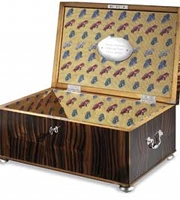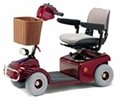
Connections:
Gifts for Elderly with Dementia
All gifts for elderly do not have to be wrapped up and given to your loved one on their birthday or Christmas - although those are always well received and appreciated!
Gifts can also involve spending quality time together - which is one of the most common suggestions as gifts for elderly.
Finding just the right activity to connect with a loved one with dementia is difficult. I know this both from being with my own family member with dementia and being staff at a nursing home.
I see families struggle all the time with how to make moments together pleasurable for everyone. I've seen families deal with the hurt of their parent/grandparent/friend no longer recognizing them. I've seen families struggle with how to connect with their loved one who they feel they only see brief glimpses of anymore.
I think the most important key is to be brave enough to keep trying until you find a way to bring back the sparkle to your loved one's eyes or the "crow's feet" that let you know you've really made them smile.
The key to making visits memorable is to tap into their interests. If you've been lucky enough to get a collection of memories before they are no longer able to share them, this will help too. If not, there are still a lot of ways to make visits enjoyable for everyone.
More Dementia Related Articles:
Dementia Progression
It's important to learn about dementia when planning gifts for elderly. That way you know more about their abilities (and future abilities) - so you can match your ideas with their reality.
There are many types of dementia including vascular dementia, Korsakoff's dementia or Alzheimer's dementia.
The disease progression for all types of dementia will be different. The presentation of dementia will also differ from person to person. A commonality is that all dementia will worsen over time. For more information regarding dementia, see our page on Elderly Dementia .
In Alzheimer's dementia, the typical progression is that short-term memory fades first and long-term memory after that. As the disease progresses, it's important to try and determine what age your loved one feels they are and try and make interactions and discussion appropriate to that.
Here are two examples:
Example #1
Alice has recently been diagnosed with Alzheimer's dementia. She forgets appointments and can no longer manage her own medications. She knows she is a grandparent and remembers her grandchildren's names. She is often confused about the date and forgets what she did yesterday.
In this case, you can be who you are as this will not confuse her. She remembers you and her grandkids. You might help her with things like remembering appointments or getting her medications blister packed. However, you might not argue with her about what she did yesterday (even when you know she's wrong) as this won't help anyone.
Example #2
George is living in a nursing home. You are his adult daughter but he does not recognize you. He walks up and down the halls and often asks for Betty. Betty was his wife (your mother) and she has passed away 10 years ago. When you've talked to him about being his daughter, he becomes upset, yells at you that he doesn't have any kids and says he has to go back to the farm.
When you show him a picture of he and Betty at their 50th wedding anniversary, he doesn't know who they are. When you say, that's Betty! He says "that old lady isn't Betty - my Betty was beautiful!". But when you show him a picture of Betty in her early 20's, he says "there's my Betty".
In this case, you are getting indicators that George thinks he is in his 20's. Likely shortly after he and Betty married because he believes he does not have kids and has to get back to the farm (they moved into town after the kids were born).
Though it is hard and sometimes painful that your own father does not remember you, it's not worth upsetting him every time you visit. Instead you can introduce yourself with your first name and talk to him about his interests from the time period he believes he is living (farming, how he and Betty met, his favourite cousin he used to fish with, etc.). Don't bring up that Betty has passed as this will only make him go through the grieving process on a regular basis.
How does this relate to gifts for elderly? Well, it's important to know as much as you can about dementia to understand how you can make the most of your time with them. If they are in the early stages, now is a great time to start creating a memory box and life story book.
Tips for Making Visits Easier for Everyone

Spending time together with friends and family makes for great gifts for elderly.
Tips for making spending time with your aging parent with dementia more enjoyable:
- Try not to correct them: often this will only upset and frustrate a person with dementia or put them through grief that is unnecessary
- Go with the "They're right, I'm wrong" policy - it's not that hard, just learn to bite your tongue
- Don't update them to the here and now - if they aren't living in the here and now: this often will just make them upset or frustrated
- You're mood affects their mood: try to stay calm, be gentle and smile often. Be warm, easy-going and pleasant.
- Do not take things personally: they don't mean it to be personal and it won't do anyone any good
- Tap into their interests or strengths: remember to always talk about or highlight their interests or those things about them that were great
- Be with them where they are: in other words, don't try and bring them back to present day. If they believe they are 20 years old, be with them at that age. Trying to bring them back to the present will usually not work and often just upset them.
For example, if George believes he is in his 20's and his wife is still alive, telling him that his wife has actually passed with just hurt and confuse him - it won't help to bring him back to the present. Telling him you're his daughter when he thinks he has no kids, will just make him wary of you and confused, even angry. Instead, introduce yourself as a friend of Betty's and tell him how much she loves him. If it makes him feel happier to spend time with you, tell him she has gone into town and asked you to come by.
Gifts for Elderly: Memory Box

A memory box is a "box" full of memories that your aging parent with dementia can pull out and sort through. They are excellent gifts for elderly.
It can also be a wonderful way for staff, family or friends to spend time with your loved one.
A memory box might be a small box or it might be a suitcase. It might be a sewing "kit" or it might be a toolbox.
It should be small enough that it can be mobile and put on someone's lap but big enough to contain some treats.
Memory boxes can be filled with goodies that will stimulate old memories or interests.
If possible, leave the lid off so they see the items inside and might explore it regularly.
If possible, they should be filled with items that remind them of their strengths, hobbies and things that interest them.
George loved to woodwork. He was a carpenter and, after he retired, he would make trinkets and small furniture for his grandkids.
George's memory box is an old tool kit filled with small wooden items he made, a few SAFE tools, the smell of sawdust, an old pair of work gloves, a handkerchief like he used to wipe his brow with. It is kept nearby and we'll often find George rooting around pulling things out.
His family often takes it with them to a table when they visit. It gives them something to talk about and George is more content.
Sally grew up in England before moving to Canada. She loved royalty and anything English, including a proper "tea".
She has a lovely box covered in flowers. Inside is a monogramed napkin, a beautiful china tea set, a book with the Royalty from the 1920's, bags of tea to give it a good smell, a few re-makes of the royal jewels.
Martha loved anything to do with family and being a mom. She also loved sewing.
Her family found an old suitcase and filled it up with baby clothes, baby bottles, buttons, patterns, a thimble, pin cushions, fabrics. She could spend hours rummaging through the suitcase.
Gifts for elderly memory box ideas:
- Fishing box
- Cooking box
- Farmers box
- Gardening boxes
- Winter boxes
- Purses filled with items for rummaging
- Dresser drawers filled with items for rummaging
Any of these memory boxes can make great gifts for elderly. They are also good distractions when a person is upset or agitated, just say "Hey Sally, can you help me sort the stuff in this suitcase?" or "Look what I found in the attic!"
You can also give a series of gifts for elderly. Maybe a photo of a memorable event one visit and a souvenir from an old trip on another visit. Keep adding to the box till it's overflowing with items from their life.
Gifts for Elderly: Life Story Book

Gifts for elderly do not have to be expensive to be enjoyable. It's more important that they are thoughtful and meaningful.
A life story book is like a living history - and they make for great gifts for elderly. It is a mini-biography to help other people connect with your loved one and can include photos and a short life story.
It might include:
- A present picture
- Plus pictures from the past (photocopies are good)
- Information significant to your loved one over their life span
- Significant people to your loved one with their names and relationships
- A short life history
- Anything of importance to the person: past occupation, hobbies, pets, personality traits, significant relationships, etc.
- Be sure to highlight their special gifts and interests
Who says it just has to be about their past? You can also add to the story book by taking pictures of future gifts for elderly - such as special outings or events that you have taken them to.
That way it keeps both you and them interested. And you do not have to feel that you need to complete the Life Story Book before you go through it with them.
It can continue to evolve as you add (and remove) items - making it one of the best gifts for elderly.
Pearl's life story book is posted on her door at the nursing home. It has a picture of her and her husband, a picture of her in her 20's and a picture of her now. It says:
Pearl loves to dance. She grew up in the small town in Troulon. She has 7 sisters and brothers and was close to all of them. She met her husband, Gary, at a dance in 1918. They were married 6 months later. Pearl had 4 children: Jack, Ted, Ruth and Sharon. She continued to dance weekly with Gary at the town hall dances. She and Jack brought up horses and Pearl had a gift for taming the most wild of beasts! Later, Pearl worked at the Troulon School of Dance with kids and Jack worked at the factory in town. Gary always describes Pearl as "a gentle soul with a heart of gold". Pearl continues to love anything to do with dance, horses or animals. She can also be relied upon to give tips on how to make any dinner a good one.
Should I Still Visit? Shoes Doesn't Even Know Who I Am!?!
I think the best advice I ever received about being with people with dementia is to "always believe there is someone in there". This has faithfully helped when working with people with dementia.
I see caregivers struggling immensely as they feel the person they loved has disappeared along with their disease. I have had families saying to me "I don't call anymore because she can't say anything back to me and I feel stupid" or "he doesn't even know I'm his son, why should I bother?"
As long as I go with the principle that you always believe there is someone in there, then no time spent together is wasted.
I can also attest to the fact that people always seem happy and more content when they have had loved ones visit.
Continue visiting and calling! Your presence makes a difference, even if you can't always see it.
Trying to make visits with elderly loved ones with dementia rewarding and enjoyable for all can be challenging - but no one said giving meaningful gifts for elderly would be easy!
Hopefully this article has provided some ideas, or at least a place to start, for you to increase the quality of the time spent with your loved one with dementia.
For even more tips and ideas for gifts for elderly: Gifts for the Elderly: Spending Quality Time with Elderly with Dementia.
Return to Gifts for the Elderly
Return to Caring for Aging Parents






New! Comments
Have your say about what you just read! Leave me a comment in the box below.